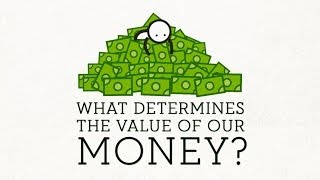(单词翻译:单击)
If you tried to pay for something with a piece of paper, you might run into some trouble.
如果你想要用一张纸来支付什么东西,你大概会遇到些麻烦。
Unless, of course, the piece of paper was a hundred dollar bill.
当然,除非你的这张纸是百元大钞。
But what is it that makes that bill so much more interesting and valuable than other pieces of paper?
可是,是什么使得这张钞票比一张纸更加有趣、有价值呢?
After all, there's not much you can do with it.
毕竟它作为一张纸,并没有什么用处。
You can't eat it. You can't build things with it. And burning it is actually illegal.
它不能吃,不能用来造东西,把它烧了也是违法的。
So what's the big deal? Of course, you probably know the answer.
那又如何?当然,你大概知道这个问题的答案。
A hundred dollar bill is printed by the government and designated as official currency, while other pieces of paper are not.
一张百元钞票是由政府印制的,并被指定为官方货币,其他纸可不是这样。但这只是使得这张纸合法的途径。
But that's just what makes them legal. What makes a hundred dollar bill valuable, on the other hand, is how many or few of them are around.
另一方面,这张纸之所以有价值是因为它们数量有限。
Throughout history, most currency, including the US dollar, was linked to valuable commodities
纵观历史,大多数货币,包括美元是与有价值的商品联系在一起的,
and the amount of it in circulation depended on a government's gold or silver reserves.
而货币的流通量,取决于政府中黄金或白银的储备量。
But after the US abolished this system in 1971, the dollar became what is known as fiat money,
但自从1971年美国政府废除了黄金兑换系统后,美元从此成为了“法定货币”,
meaning not linked to any external resource but relying instead solely on government policy to decide how much currency to print.
意思是货币本身与其他东西没有关联,它的价值仅仅由政策以及发行量来决定。

So which branch of our government sets this policy?
那么是哪个政府部门来指定这种政策呢?
The Executive, the Legislative, or the Judicial?
行政部门?立法机构?还是司法机构?
The surprising answer is: none of the above!
出乎意料,它们都不是!
In fact, monetary policy is set by an independent Federal Reserve System, or the Fed, made up of 12 regional banks in major cities around the country.
事实上,货币政策是由独立的美国联邦储备系统指定的,它也称为美联储,这个系统由全美国内12个设立在主要城市的地区性储备银行组成。
Its board of governors, which is appointed by the president and confirmed by the Senate, reports to Congress,
储备委员会成员由总统提名,经国会参议院批准后方可上任。
and all the Fed's profit goes into the US Treasury.
美联储所有利润须转交美国财政部。
But to keep the Fed from being influenced by the day-to-day vicissitudes of politics, it is not under the direct control of any branch of government.
为了使美联储不受变幻莫测的政治因素影响,它不受任何政府部门的直接控制。
So why doesn't the Fed just decide to print infinite hundred dollar bills to make everyone happy and rich?
那美联储为什么不干脆印无数的钞票让每个人都又开心有有钱呢?
Well, because then the bills wouldn't be worth anything.
如果那样,钞票就不再值钱了。
Think about the purpose of currency, which is to be exchanged for goods and services.
想想,货币产生的目的是用来交换商品及服务。
If the total amount of currency in circulation increases faster than the total value of goods and services in the economy,
在一个经济体中,如果市场中的货币量比其等值的商品和服务上升的快,
then each individual piece will be able to buy a smaller portion of those things than before. This is called inflation.
每一分钱能买到的东西就会比原来少很多。这叫通货膨胀。
On the other hand, if the money supply remains the same,
另一方面,如果货币供给量不变,
while more goods and services are produced, each dollar's value would increase in a process known as deflation.
商品和服务的量增加每一元钱的价值就会增加,这个过程叫做通货紧缩。
So which is worse?
哪一种情况更糟糕呢?
Too much inflation means that the money in your wallet today will be worth less tomorrow, making you want to spend it right away.
过度的通货膨胀意味着今天在你钱包里的钱明天价值更少,使得你想要赶快把它花掉。
While this would stimulate business, it would also encourage overconsumption, or hoarding commodities, like food and fuel
这会刺激经济,也会促使过度消费以及对食物,燃油等商品的囤积,
raising their prices and leading to consumer shortages and even more inflation.
物价抬高,导致消费人数减少,加剧通货膨胀。
But deflation would make people want to hold onto their money, and a decrease in consumer spending would reduce business profits,
但通货紧缩会致使人们想要守住自己的钱,减少消费支出,降低了商业利润,
leading to more unemployment and a further decrease in spending, causing the economy to keep shrinking.
导致失业现象更严重,进而使消费支出越来越少,经济不断地紧缩。
So most economists believe that while too much of either is dangerous, a small, consistent amount of inflation is necessary to encourage economic growth.
所以,大多数经济学家们认为,两种情况到了极端都很危险,轻微且持续的通货膨胀对促进经济增长是必要的。
The Fed uses vast amounts of economic data to determine how much currency should be in circulation,
美联储用大量的经济数据来决定流通的货币量,
including previous rates of inflation, international trends, and the unemployment rate.
这些数据包括历史通胀率国际贸易以及失业率。
Like in the story of Goldilocks, they need to get the numbers just right in order to stimulate growth
如同Goldilock的故事里说的一样,美联储要让货币供给量恰到好处,
and keep people employed, without letting inflation reach disruptive levels.
才能在避免通货膨胀失控的情况下刺激增长,保持就业率。
The Fed not only determines how much that paper in your wallet is worth but also your chances of getting or keeping the job where you earn it.
总之,美联储不仅决定着你钱包里钞票的价值,也决定着你是否有机会保住工作得以继续赚钱。


